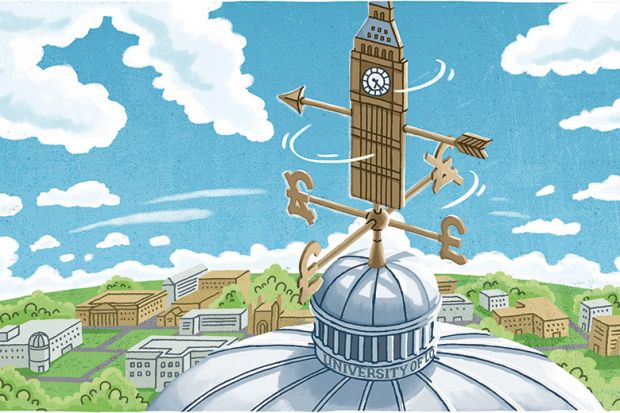Damian Green, Theresa May’s most senior minister, might think that there is a case for a “national conversation” about tuition fees in England. But in making his statement without giving thought to the consequences, he has opened a can of worms.
Soon afterwards, Andrew Adonis pitched in with the bold assertion that tuition fees should be scrapped. Andrew is probably the brightest person I worked with in government and a fellow early riser: our 7.30am conversations were like tutorials for me in public policy. But on this he is dead wrong.
I would urge Andrew and others advocating for fees to be scrapped to recall why “top-up fees” were introduced in 2005. Universities had endured year-on-year reductions in the unit of resource: in 1997, it was estimated to have fallen by 40 per cent since 1976. For understandable political reasons, higher education was (and will always be) behind other priorities for increased state spending, such as schools, housing and the NHS. The consequences of ever-diminishing university budgets were plain: dilapidated campuses, overcrowded lectures and a lack of focus on the student experience.
Since 2005, universities have revolutionised their facilities and greatly enhanced their beneficial impact on society. Student satisfaction has increased steadily, up from 80 per cent in 2005 to 85 per cent in 2016. Student numbers have increased, with applications rising fastest among students from poorer backgrounds (up by 43 per cent since 2009). The artificial cap on student numbers has been removed. Graduate employability and the graduate earnings premium have increased, demonstrating that graduates have the skills that employers need.
Yes, vice-chancellors’ pay has also gone up since 2005. I acknowledge the need for restraint from the top: that’s why I asked my board to freeze my own pay. But v-cs’ salaries account for less than 0.2 per cent of university budgets. So let’s not mislead people by claiming that higher fees are a consequence of v-c pay demands.
I recognise that the recent general election, with the very welcome increase in youth and student voting, has brought renewed focus on the funding of higher education. We should debate this. But the debate should face up to the facts of the current system. We do not have a huge, unaffordable “debt burden” for graduates. Rather, we have an affordable, progressive, post-graduation repayment system, whereby the beneficiaries of a university education – still less than half the population – pay back a proportion of the cost of the benefit that they have received provided they are earning more than £21,000 a year. After 30 years, any unpaid debt – and most graduates will have some – is written off. If non-students could get terms like that on the high street, there would be a stampede to the banks.
Advocates of scrapping fees need to answer some really hard questions about the consequences of such a course of action.
How could it avoid bringing back the student number controls that used to restrict access? How could we prevent university autonomy – the envy of the world and the driver of quality in our system – from being fatally compromised by a return to child-like dependency on the annual goodwill of the government? And is it really feasible that any government, once in power, would deliver £11 billion for universities to make good the funding loss? If fees were abolished with no compensatory increase in public funding, my university (and we are typical) would be hit with a reduction of income from £113 million to £33 million: a 71 per cent cut. Because never forget that the coalition government in 2012 cut the teaching grant by 80 per cent before ushering in £9,000 fees to compensate. How could we be expected to cope with such a cut?
Without real answers to these questions, the advocates of scrapping fees are not serious.
There are, however, sensible and progressive reforms that should be considered. While I strongly promoted the £3,000 fee regime, the increase to £9,000 arguably went too far in shifting the balance of costs from the state to the individual. But any change would need a transition phase and guarantees to universities – for the benefit of their students – about the mechanism by which a reduction in fee income would be compensated.
The rate of interest that graduates repay should also be reviewed. The regime that I oversaw applied no real rate. The change brought in by the present government imposes, from this September, a 6.1 per cent interest rate. This is arguably penal.
And the government should urgently reconsider the scrapping of non-repayable maintenance loans for students from low-income families. It is when you are studying that you need the cash, and grants helped to drive up participation from poorer students.
So “yes” to sensible debate and reform. But “no” to knee-jerk, uncosted and damaging reforms the likes of which Andrew Adonis would never have put forward while serving in government.
Bill Rammell is vice-chancellor of the University of Bedfordshire and was higher education minister in the last Labour government.
Register to continue
Why register?
- Registration is free and only takes a moment
- Once registered, you can read 3 articles a month
- Sign up for our newsletter
Subscribe
Or subscribe for unlimited access to:
- Unlimited access to news, views, insights & reviews
- Digital editions
- Digital access to THE’s university and college rankings analysis
Already registered or a current subscriber? Login





